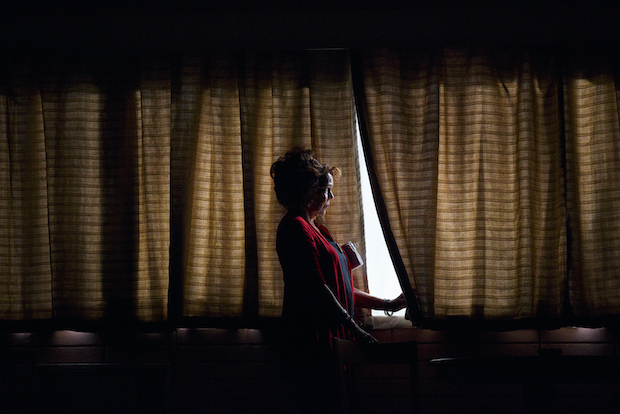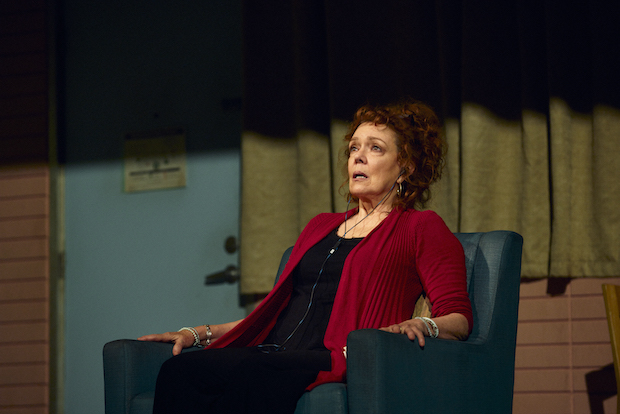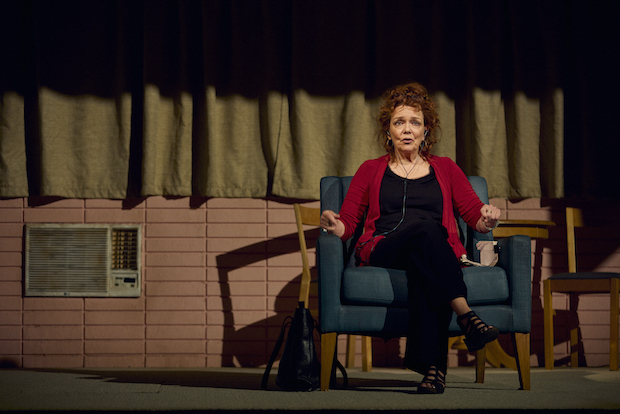Review: A Woman Survives Hell in Broadway's Dana H.
Lucas Hnath’s latest Broadway play is based on a shocking true story.

(© Chad Batka)
If I disappeared tomorrow, would anyone miss me? Would anyone look for me? And would anyone help me find my way home? These disturbing questions are likely to swirl through the minds of all but the most self-assured viewers of Dana H., Lucas Hnath's one-woman thriller, now playing Broadway's Lyceum Theatre. It's about a woman who is kidnapped for several months by a violent neo-Nazi meth addict. Not only is it the wildest true story on any stage in New York City, but it features a performance that must be seen to be believed.
That would be the work of Deirdre O'Connell, one of the greatest stage actors of our time, who is making only her third appearance on Broadway (she's a much more frequent presence off and off-off-Broadway). We never hear O'Connell's voice throughout the 75-minute play. Instead, she lip-synchs to prerecorded audio of an interview conducted between Steve Cosson (artistic director of the Civilians) and Dana Higginbotham (the playwright's mother, to whom this actually happened).
It's a more difficult task than it sounds: O'Connell cannot flub a line, forget a cough, or miss a breath without breaking the illusion. Inflections, pacing, and pauses are entirely dictated by the audio, leaving the actor no control over the spoken text. The fact that O'Connell never breaks with the audio and still manages to bring so much of her unique verve as a performer to the part shows her mastery of a craft in which limitations are a springboard for creativity. It is also a testament to the indomitable human spirit, even under the most severe captivity.

(© Chad Batka)
"Severe" seems like too mild a word for what happened to Dana. While working as a chaplain in a hospital psychiatric unit, she meets a patient named Jim, who was raised from a young age into a white supremacist crime syndicate with a strong presence in the prison system. Thinking that she can help him lead a normal life, she begins to minister to him. When Jim is discharged from the hospital on Christmas Eve and finds himself with nowhere to go, she takes him into her home, and then helps him find his own place. He repays the favor by kidnapping her and taking her on a monthslong crime spree, using her name to purchase weapons that would normally be restricted to a felon like him.
Audience gasps regularly punctuate Dana's shocking narrative. The most disturbing part is that no matter where they go, Jim seems to know people, including police officers — and practically none of them are interested in helping her escape. Nor does it seem like anyone is actively looking for her, something Jim probably considered when he chose her as a victim. We see how a smart, confident woman like Dana, who is no stranger to the seedier aspects of life, becomes trapped in the American criminal underworld, a pawn of forces way beyond her control. This is one of the things that makes Dana H. such a perfect companion piece to its co-tenant at the Lyceum, Is This A Room — because what gang is bigger and more powerful than the US federal government?

(© Chad Batka)
Director Les Waters coaxes us down the rabbit hole of this incredible story until we are in too deep to find our way out. The staging takes the form of an interview in a dingy Florida motel room (scenic design by Andrew Boyce). O'Connell sits in an armchair downstage center, wearing a simple black outfit topped with a red cardigan (costumes by Janice Pytel). We hear the real Dana's voice over the speakers, with clear breaks in the audio that serve the same purpose as cuts in a film (sound designer Mikhail Fiksel and lighting designer Paul Toben collaborate seamlessly to establish this convention from the beginning). Notes of tension throb under the recorded interview, and the lighting shifts menacingly until we begin to see the motel room as a terrifying space, where even the filthy air-conditioner and ugly table lamps pose a threat.
Yet even in this dark place, Dana emits an inner light that is never extinguished. O'Connell unearths a furtive smile in many of Dana's lines, which might not be obvious to the casual listener — especially considering the subject matter. This gallows humor seems to be one of the ways Dana can process her traumatic experience, and it helps guide us through to the other side of this harrowing tale. That makes Dana H. inspirational in the best way: If she can laugh at her captor, you can laugh at the boss or neighbor or petty tyrant on the PTA who is making your life miserable. And if she can survive this awful ordeal, you can survive the next day.











